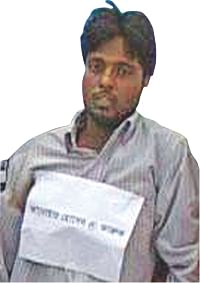'Mastermind' owes one to Rab, cops
'Mastermind' owes one to Rab, cops

He had been nobody's headache since he got out of jail on bail back in 2012. The prison-van ambush in Trishal last month has thrust him onto the list of the country's most wanted criminals.
Anwar Hossain Faruq, a leader of the banned Jama'atul Mujahedeen Bangladesh (JMB), had been operating comfortably under the law enforcers' radar before he struck in Trishal, according to investigators.
He got the law enforcers off-guard by pulling off the attack on the prison van carrying three convicted JMB militants from Kashimpur jail to a court in Mymensingh on February 23. Two of the militants escaped; another was captured while fleeing and later killed in “crossfire”.
Faruq had been moving freely since his release on a six-month bail on February 29, 2012, and planning the Trishal operation. He contacted his JMB comrades, including those in jail, and collected funds and firearms, investigators told The Daily Star last week.
He even met the three JMB leaders in court, most probably in Mymensingh, and promised to get them out of jail as soon as
possible, investigators added.
Faruq was JMB's one of those Majlish-e-Shura members who had a vision to reorganise the banned outfit under a new leadership following the execution of its top leaders, including its supremo Abdur Rahman and the second-in-command, Siddiqur Rahman alias Bangla Bhai, in 2007.
He was arrested from the capital's Mirpur-1 on July 10, 2007. While detaining him, Rab found two 9mm pistols, nine bullets, seven computers and jihadi books in his possession.
But he could secure the bail, thanks to alleged non-cooperation of 26 witnesses -- mostly from Rab and police -- who did not show up during court hearings.
So far only four witnesses have appeared in hearings though the court issued repeated summons on police and Rab regarding producing witnesses.
Securing bail, Faruq never attended court hearings. His lawyer managed to get the hearing dates changed again and again and even the six-month bail extended by a year.
The bail term ended in August last year.
The law enforcement agencies have launched a desperate hunt for Faruq. They suspect the JMB leader and his associates might be holed up in the Tangail forests.
His next hearing is due on May 14.
After his arrest in 2007, an arms case was filed against him with Shah Ali Police Station. The charge was framed in July 2008, paving the way for his trial before Special Tribunal-7 of Dhaka.
But, as records show, it took 10 months for the trial to begin due to the absence of the complainant, Sub-Inspector Jainal Abedin, who was attached with Rab-4.
Jainal turned up on April 22, 2009 and that too after several summons issued by the court. He was the lone witness till February 2012.
Contacted, Additional Public Prosecutor of Tribunal-7 Rizaur Rahman said it was the duty of police to bring witnesses to the court. “We didn't show negligence in this regard,” he added.
Selimuzzaman, OC of Shah Ali Police Station, declined to make any comments while Rab's Media Wing Director Habibur Rahman said the elite force's duty was limited to capturing the militants.
Another police official told this correspondent that most of the witnesses could not be traced or contacted because the police personnel who knew them kept on being transferred. “We simply lost track.”
A senior police official said they failed to keep an eye on Faruq as they were busy tackling political violence and the national election.
Faruq, aged 32, is also the prime accused in a case for the 2007 murder of madrasa teacher Rafiqul Islam of Mymensingh. Charges were also framed against him for the blasts at Mymensingh cinemas on December 7, 2002.
He dodged hearings in these cases as well.
Hailing from Kazaikata village under Melandah upazila of Jamalpur, Faruq studied at different madrasas in Jamalpur, Mymensingh and Dhaka.
He was very mischievous from his tender age. When he was a student of Class III at Darirampur Primary School in Trishal, his schoolteacher father sent him to a madrasa. As he grew up, he isolated himself from his parents.
[Chaitanya Chandra Halder and ADM Aminul Islam contributed to this report]